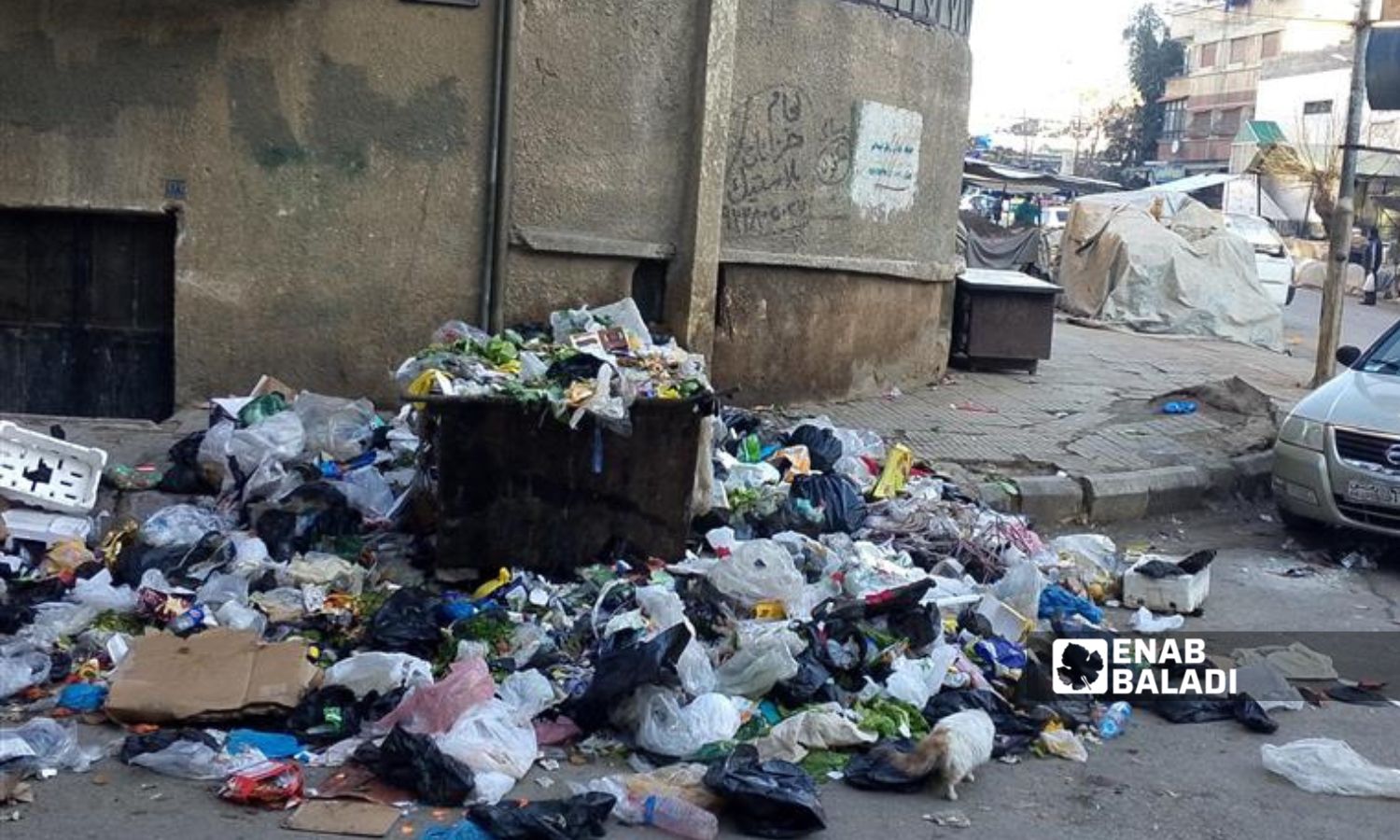



Waste is piling up in most streets of Damascus and its suburbs, causing concern among residents that extends beyond visual pollution to encompass threats to health and the environment alike.
The reasons for this phenomenon are numerous, necessitating a collective effort between the public and private sectors and civil society to find effective solutions.
Damascus has been experiencing a decline in waste collection and processing services for over a month, as waste overflows and accumulates around trash bins. Additionally, the time taken to clean these bins has increased to two or three days, whereas it was previously done daily, according to Saleh Khalouf, a resident of the al-Sinaa neighborhood in Damascus.
Sabri Abbas, Supervisor of Parks, Cleanliness, and Solid Waste Management at the Damascus Cleaning Directorate, explained to Enab Baladi that the current number of employees is 2,500, including engineers, supervisors, inspectors, and workers.
He added that the deficiency in the number of sanitation workers is due to a poor assessment of the required personnel by the previous administration in the city of Damascus, based on global standards regarding the ratio of workers to the population. The directorate is currently working on studying and estimating the appropriate number of workers necessary to carry out the required tasks effectively.
The accumulation of waste in the streets is a result of the lack of awareness campaigns and community involvement in keeping the city clean during the previous regime, which led to irregular disposal times by citizens. The municipality is working to address this issue through awareness campaigns, Abbas mentioned.
He also noted that garbage is collected from the bins daily, around the clock, in three shifts, and transported to a temporary dump and then to the permanent dump via large, specialized vehicles. Furthermore, street cleaning and washing occur within the city, along with periodic cleaning campaigns.
Regarding the vehicles designated for garbage collection, Abbas pointed out that the fleet is outdated and past its functional lifespan due to negligence in maintenance operations. He clarified that “there is a strategy the directorate is working on to enhance the readiness of existing vehicles and renew them in accordance with Damascus’ conditions, especially since there are old and narrow neighborhoods, and there is a specific system for supplying vehicles with fuel.”
The Cleaning Directorate in the Damascus governorate aims to implement a vision that meets residents’ aspirations, positioning Damascus among the world’s cleanest cities, and to work according to a programmed, developed, and environmentally friendly system.
Additionally, according to the established strategy, it seeks to involve the community in waste-cleaning and sorting processes to be treated, achieving the best social and economic impact, according to Abbas.
Rural Damascus faces the same scene and challenges as the city of Damascus, leading to a significant proliferation of rodents and flies, which negatively impacts public health.
Taghreed Murad, a resident of the town of Jdeidet Artouz in rural Damascus, informed Enab Baladi that the municipal council has not fulfilled its duties since before the fall of the previous regime, and the situation continues to this day, with garbage being cleaned from the streets every five days, and there are no cleaning workers or volunteer cleaning campaigns.
She added that the accumulation of garbage contributes to the spread of diseases, especially since the waste dump is located near residential buildings, in addition to the increasing rodent population in the town due to this escalating problem.
Louay Mahmoud, Director of the E-Clean Environmental Organization in rural Damascus, stated to Enab Baladi that there are several reasons for waste accumulation, including residents not adhering to waste disposal schedules and discarding waste in random dumping sites and areas, as well as old accumulations. Additionally, there is a shortage of workers, poor technical condition of vehicles, and a high population density in informal housing areas.
Mahmoud noted the lack of sanitation workers, stating that according to preliminary statistics, there are only 1,200 sanitation workers, while the governorate needs more. Many workers suffer from health issues, including chronic diseases and disabilities. After completing the census, there will be a plan to compensate for the shortage and redistribute workers geographically based on their places of residence, along with a plan to improve workers’ financial conditions, according to government visions.
Mahmoud indicated that the cleaning vehicles in the rural Damascus governorate have been subject to theft, and the remaining vehicles are outdated and in poor technical condition. There is a plan to assess their numbers for repair and redistribution, and some urgent repairs are currently being made, including supplying vehicles with fuel to continue operations.
The E-Clean Environmental Organization aims to eliminate all random dumps and existing accumulations in towns and streets and maintain cleanliness across all administrative units. Additionally, they have a work plan to clean all main roads leading into Damascus from other governorates.
It is evident that the issue of waste accumulation on the streets requires efforts and cooperation between the government, local communities, and raising residents’ awareness about the importance of maintaining cleanliness, as this problem will negatively affect everyone, making it essential to take immediate action to address it.
if you think the article contain wrong information or you have additional details Send Correction